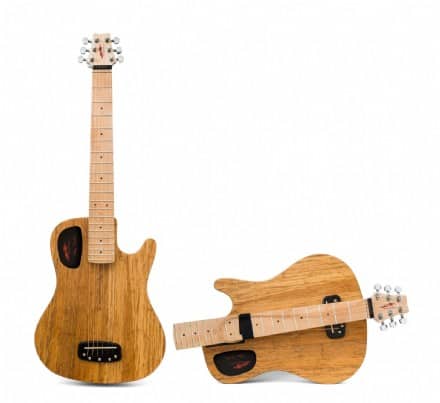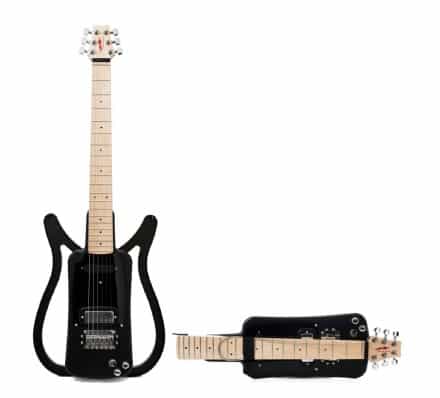Look around on any music message board and you will inevitably stumble across this question:
Why aren’t folding guitars a thing?

Despite the fact that they’ve been around for some years now, and on sale in the UK since at least 2011, a surprising number of players remain unaware of the instrument’s existence. Consequently, players who travel on a regular basis find themselves in a succession of endless pleading-praying scenarios.
Can I please – please – store my instrument in the aircraft cabin? Can it please, please, please not be crushed to matchsticks when it inevitably ends up in the hold?
It’s this that ultimately inspired the creation of the folding guitar. While other options are available – smaller, down-sized ‘travel guitars’ – they have their limitations. Although a great idea, and able to deliver a strong performance if carefully crafted, they’re not that easy to play if you have averagely-sized male hands, or larger. And, although smaller, they’re still larger than the typical carry-on bag allowance.
Folding guitars though, they’re a little bit different.
What is a folding guitar?
Well, it’s a guitar. And it folds. In every respect but one, a well-made folding guitar is just like any other well-made guitar. It looks like a guitar, feels like a guitar and sounds like a guitar. It’s robust when being played. It sounds great – when tuned properly.
The only difference is that when you need to travel with it, you can fold the neck down over the body, making the instrument half the regular size. And consequently, half as fragile.
Folding versions of all guitar types –– classical, acoustic bass, electric – are now available. And each one plays just as their unbending counterparts would.
So, how do folding guitars work?
Imagine a traditional guitar body with a neck that can be unscrewed and folded down over the sound hole – or where the sound hole would be. In some cases, the strings can be carefully coiled and tucked safely away inside the body. Where design makes this impossible, they’re securely tethered to the side, to prevent any damage while travelling.
This is all made possible by a small screw which, thanks to clever setting, holds the neck firmly in position when in place, or allows it to be moved forward when removed. And that is the essence of the folding guitar.
To return it to its playable form, you simply untether the strings, straighten the neck and tighten the screw. The strings will need tuning, but no more than they would before any session after any journey. In most cases, thanks to the locking keys at the back, they’ll be as tuneful as they were before you folded them away. It sounds unlikely, but that’s the whole point of the design. It would be a useless instrument if that weren’t the case.
But that’s not the limit of the folding guitar. Some models go a step further.
For those who really want to minimise the carry size of their guitars, there are bodies with detachable polymer ‘wings’. Although the assembled instrument is equal in size and function to traditional guitars, to store for travel the wings can simply be ‘snapped’ off, the neck folded, and you have a truly tiny carry-on bag.
Using this technique, the Snap Dragon SnapaXe A, for example, is able to be packed down to just 54 x 8 x 10 cm, which is frankly ridiculous,. This can’t help but raise the thought of shoddy workmanship and an instrument that will rattle all over the place while being played. And that’s an entirely understandable viewpoint. But again, if that were the case, it would be a futile creation. No one would buy it. No one would use it. But they do.
So, down to the nitty gritty…
Does the folding affect the integrity of the instrument and the sound?

In a word, no. Play as hard as you like, and the neck of a folding guitar will remain in place. That’s what it’s been designed for.
The strings will also maintain their veracity, as long as you store them correctly. As for the sound, well, that partly depends on your playing, but tonally, it would be hard to spot the difference in a blind test.
Why would I need a folding guitar?
For most people, it’s regular travel that leads to the purchase of a folding guitar. It’s becoming harder, when flying, to find an airline that will allow guitars to be taken on as hand luggage. It seems that all space is at a premium, and hold storage brings so many potential problems for an instrument.
It’s not just the worry of the baggage handler’s delicacy – and that’s not knocking them, their job is to move cargo as quickly as possible, it’s your problem if you’ve stuck something fragile in the hold. Temperature fluctuations aren’t great for guitars either. And other modes of transport aren’t always better, especially if you’re stuck for space.
Other people like folding guitars because they’re easier to carry wherever you’re going. Grab a backpack and you’re done. If you use public transport, then that’s always going to be a good thing.
A folding guitar isn’t going to be for everyone. Some people never play outside of the house. Some like to leave their instruments out on display (which, by the by, isn’t always the best thing for your guitar’s health) and glory in their size and beauty.
Some just like tradition. But, if you are someone who likes to play on the go, then it’s good to remember that folding guitars are a thing. And you now know how they work.
